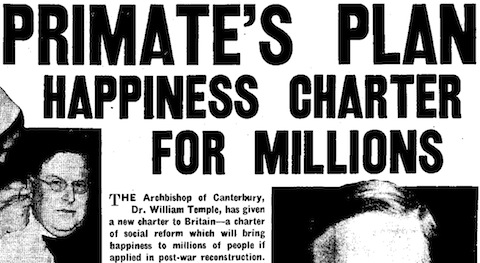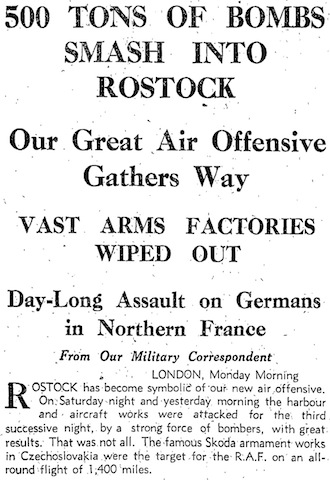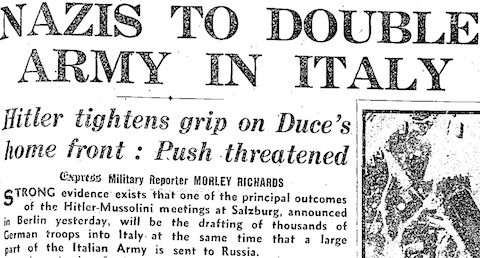
The front page of the Daily Mirror today is almost wholly given over to a story which the other papers are far less interested in. The recently-installed Archbishop of Canterbury, Dr William Temple (that’s him on the left, though what is being done to him I have no idea; and that’s his forehead on the right), used a speech in Manchester yesterday to give ‘a new charter to Britain — a charter of social reform which will bring happiness to millions of people if applied in post-war reconstruction’ (1). Its nine points are:
1. Provision of decent houses for the people of this country;
2. Every child to have adequate and right nutrition;
3. Equality in education. There shall be genuinely available to every section of society the kind of education will develop their faculties to the full;
4. Adequate leisure for personal and family life. Where the family is separated because of employment, there should be two days’ holiday each week;
5. Universal recognition of holidays with wages;
6. The application of science to discover labour-saving devices, to save labour instead of labourers;
7. Wide appreciation of the fact that labour is a partner in industry, just as much as management and capital;
8. Recognition by workers and employers alike that service comes first, and the opportunity to make profit comes afterwards;
9. The opportunity for all people to achieve the dignity and decency of human personality.
An accompanying article by A. W. Brockbank says that Temple also warned against yielding ‘to the lure of people who try to persuade us that it would be wise to establish such a non-party State'”:
‘The minority must have the right to become the majority if it can. It must be lawful to be in opposition to the Government.’
Just who he has in mind here is not made clear.
Speaking of Manchester, the Manchester Guardian reports that in 1941, crime there increased by 20.1% over 1940 (6):
The principal increases are in theft of bicycles, simple larceny, house-breaking and larceny, and false pretences and fraud.
It’s not all bad news: the number of shoplifting incidents decreased by 174 to 460, possible due to ‘the Limitation of Supplies Order, which reduces the quantity of goods available for display’. Manchester’s Chief Constable, Sir John Maxwell, suggested that the crime surge ‘might reasonably be attributed to crime conditions, the extra duties imposed on the police, and to the great advantage to the felon operating in the “black-out”‘. He didn’t mention the opportunities created by air raids (though of course Manchester hasn’t had a really heavy blitz since 1940). According to the Daily Mirror, ‘the shattered streets of Bath‘ have experienced ‘a wave of looting’ since it was bombed (1). There are ‘complaints that jewellery, money and goods had disappeared from ruined homes’, and ‘money boxes had been wrenched from gas and electricity meters’. In response, the Home Guard in Bath was been issued with live ammunition last night:
They patrolled in pairs, and had orders to take drastic action if they saw thieves robbing bombed buildings.
Another consequence of bombing is an increased traffic in rumours. Following an outbreak of them after the Norwich raids, the Eastern Regional Commissioner, Sir Will Spens, has asked the public not to believe or pass on rumours about air raids, (Guardian, 6):
There were rumours of heavy attacks on towns not attacked. Broadcasts were alleged to have been given which were not given. The number killed was in some cases multiplied tenfold.
Norwich and especially Bath have particular cause to thank the National Fire Service — according to Herbert Morrison, Minister of Home Security, ‘now the most powerful in the world’ (Daily Express, 4). He said:
The Regional Commissioner has reported to me that the N.F.S. saved a great part of Bath. Under the old system the whole town might — almost certainly would — have gone.
Indeed, the NFS ‘has justified itself in the concentrated air raids on British “Baedeker” towns’, its first real test since ‘1,450 local fire brigades in Britain were telescoped in 37 fire forces’, with a ‘Fire Control Room in Whitehall’. This means that ‘The question of “town boundaries,” which often led to disastrous delays, has been eliminated’:
When there is a raid on any part of the country firemen and appliances from surrounding areas concentrate their energies.
Nearly three thousand people attended York Minster yesterday for ‘the special service of commemoration of the victims of the air raid on Tuesday night’ (Yorkshire Post, 6). The Dean of York, the Very Rev. Eric Milner-White, gave the address, drawing upon ‘the motto of the West Yorkshire Regiment, Nec aspera terrent‘ which is repeatedly inscribed on the walls of the Minster:
‘It is a motto,’ said the Dean, ‘which might stand for York, which its citizens had proved on April 29, 1942, for ever. The desperate moment did not find them afraid, and the rough paths had not dismayed them. On that morning, dawning red before the dawn was due, York gave its toll in the defence of our England, our Empire and our race. We do not grudge it. We have not complained. We will be proud of it. But it is a heavy payment, and there is a sore pain at our hearts. I expect it is always so. The day of grandeur is always a day of suffering.
He predicted that York would one day raise a memorial to the dead, ‘a new sort of memorial’, dedicated not to ‘sailors, soldiers and fighting men who made great sacrifices in far-off places’, but to ‘warriors like these’:
These were the aged who died for children they would never see. These were fathers and mothers who suffered and hallowed England’s homes under the ruins of their own; these are the children who gave their years of lovely promise that freedom might play for ever in our streets.
The Yorkshire Post reprints a letter from one of the children who survived the raid, Valerie Johnson, 15, ‘a senior pupil at the Convent School’ which was hit by at least two bombs, one a delayed-action one. She’s far less sombre than the Dean, writing to her father that ‘We’re school-less! We woke up early this morning with bombs dropping quite close, so we all skedaddled down to the shelters’.
When the bomb fell, the lights went out, the whole place rocked, the gas pipes broke, and we heard debris falling — it seemed on top of us but it wasn’t quite. In the next cellar six lay mistresses and one nun were buried and both the entrances to our cellar were blocked […] All the smaller children became quite panicky, but we managed to quieten them, while being nearly suffocated by gas and coal dust […] It was horrid in there though by ourselves, with gas leaking and the air thick with dust and children screaming and black darkness, but we came through O.K.
After ‘twenty minutes — it seemed like twenty hours’ the occupants of both cellars were rescued. Five of the nuns were killed in the raid; ‘three day girls in our class alone are missing’ (though obviously they weren’t at the school when the raid took place). The school is ruined, though two rooms might be used to teach classes in turns. The boarders have been sent home: ‘Mummy was very surprised to see me, as she didn’t know York had had a blitz’. There was no blitz on Saturday night, by the way, yet German radio reported in Russian that Vichy French aircraft carried out reprisals for ‘the British raid on Paris’ (Express, 1). The translation reads:
Last night the first French reprisal raid was carried out on several towns in Southern Britain. French airmen dropped bombs and leaflets saying that every R.A.F. raid on France would be followed by a French raid on Britain twice or three times as powerful.
The Yorkshire Post‘s London correspondent suggests that this is ‘a German attempt to scare Russia by the suggestion that the French Air Force can deal with Britain while the main strength of the Luftwaffe is concentrated on the Eastern Front’ (2).
There’s so much of interest today that I’ll have to pass over — I haven’t even mentioned the continuing bad news from Burma, which dominates most of the big headlines; nor the Express‘s critique of Saturday’s mock invasion of Westminster (much too unrealistic: ‘EVEN FIFTH COLUMNISTS REFUSED TO BE “CADS”‘, 3); nor yet Sir Stafford Cripps on Britain’s commitment to Indian independence after the war. But I must at least quote from two letters to the editor. The first, in the Guardian is from E. Lindsay, possibly Erica, the wife of A. D. Lindsay, Master of Balliol (the address is given as ‘The Master’s Lodging, Balliol College‘, 4). She says it is ‘a terrible thing’ in this just war ‘to have one’s single mind and purpose sullied and hammered from within’:
Yet this thing happens when the B.B.C. offers us, as for our encouragement, the evidence of civilian refugees streaming out of a bombed German port.
Surely we are mature enough of mind and purpose to understand that there is a war to be waged involving mortal suffering which all must mourn and of which none need boast, sullying themselves and their cause. If those responsible for the presentation of news on the wireless could hear the comments of simple people who have already tasted the full horrors of bombing they would know how little such descriptions are in tune with the temper of our nation in its great crusade.
The second appears in the Yorkshire Post and is from R. A. Chadwick of Leeds, who urges that to preserve peace after the war the Allies should decree ‘that no German, Italian or Japanese shall own an aeroplane, fly an aeroplane, make an aeroplane, operate an air line, or own, occupy, manage, or be employed on any aerodrome’, and further ‘that no aeroplane can be flown anywhere in the world unless both the ‘plane and the pilot are licensed by Britain, the U.S.A., Russia and China (all four of them)’ (2).
![]() This work is licensed under a Creative Commons Attribution-NonCommercial-NoDerivatives 4.0 International License.
Permissions beyond the scope of this license may be available at http://airminded.org/copyright/.
This work is licensed under a Creative Commons Attribution-NonCommercial-NoDerivatives 4.0 International License.
Permissions beyond the scope of this license may be available at http://airminded.org/copyright/.





Pingback: Airminded · Post-blogging the Baedeker Blitz: conclusion